What Is An Shackle?
Shackles, Grilletes in Spainish, commonly found in the lifting and transportation industries, are U-shaped metal parts with pins or bolts at the opening. They are used to connect wire ropes to the unloading device of lifting equipment. Their main function is to transfer the tension between the wire rope and the equipment to the shackle during the process, so as to achieve the lifting and transportation of heavy objects. Shackles can quickly and effectively connect various pipes and components. Ensuring the secure connection of these components is essential for the safety and functionality of rigging, towing, hauling, lifting, hoisting, lashing and other operations.
Table of Contents
Different Type Of Shackles
Before we begin, let’s first understand the different parts of a shackle so that when we use terms such as “bow”, “ear”, “pin” or “shoulder”, you will know what we mean:
The Parts of a Shackle
Bow – The curved part of the shackle body opposite the pin, also commonly called the ring, body, D-shaped or bowl.
Ear – The part of the shackle body that supports the shackle pin.
Pin – The steel bolt used to connect the two ears of the shackle.
Shoulder – The portion of the pin that contacts the lug when fully threaded or engaged.
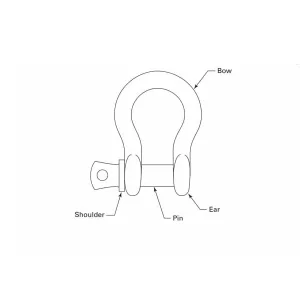
Always make sure the shackle you choose meets or exceeds the working load limit for the task at hand and is comparable to the working load limit (WLL) of the slings and other rigging hardware being used.
Shackle Bow Types: Anchor Shackles vs. Chain Shackles
Anchor Shackles/ Bow Shackles
The terms anchor shackle and bow shackle are used interchangeably to refer to a shackle with a larger, rounded “O” shaped bow. The larger bow allows this type of shackle to handle side loads or be used for multiple sling leg connections. However, bow shackles typically have a larger, more defined bow area than anchor shackles. The rounded design of anchor and bow shackles allows them to handle loads from multiple directions without significant side loads.
The larger ring shape of an anchor or bow shackle does reduce its overall strength, but also allows it to handle larger straps.
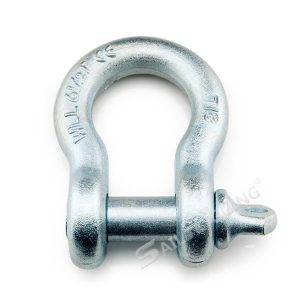
Chain Shackles / D Shackles
Chain shackles, also known as D-Shackles, have a narrower D-shaped bow than anchor shackles. Since these shackles are designed and rated for axial tension, they should not be subjected to side loads, which can cause the shackle bow to twist or bend.
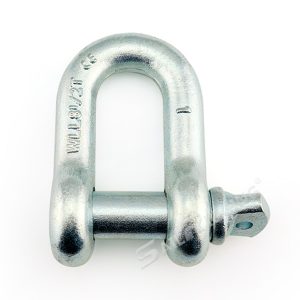
Shackle Pin Types: Screw Pin vs. Bolt Type vs. Round Pin
Screw Pin Shackles
The type of shackle pin is a key factor in deciding which shackle is best for your application.
Screw Pin Shackles are suitable for quick assembly and are used to connect or disconnect two-component installations because you can easily and quickly insert the pin into the ear and tighten it. There is a minimal risk of the pin loosening when using a screw pin shackle in lifting operations and it is not recommended for permanent or long-term installations. Screw-on-pin anchor shackles are suitable for static loads, side loads, and multi-leg directional loads.
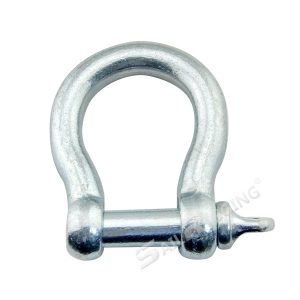
Bolt Type Shackles
Bolt-type shackles, also known as safety pin shackles, are safer than screw pin shackles because the bolt/nut/split pin and split retaining pin combination cannot loosen during use, and are suitable for any lifting operation that uses a round pin or screw pin.
Bolt-on anchor shackles are suitable for applications where movement may be required or where the connection needs to be maintained semi-permanently or for a long period of time.
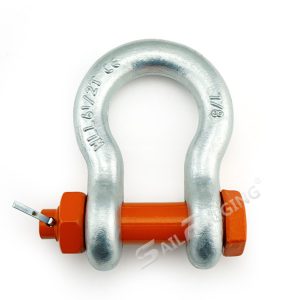
Round Pin Shackles
Round Pin Shackles consist of a round, unthreaded pin that is held in place with a cotter pin. This type of shackle performs well in applications where the pin may be subject to torque or torsion.
They are most commonly used in tie-downs, towing, suspension, or applications where the load is applied strictly in a straight line. A cotter pin is used to secure the shackle pin.
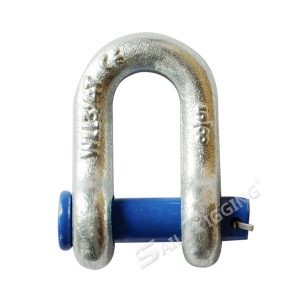
How Are Shackles Measured?
Measure the diameter of the bow/the straight portion of the shackles, excluding the pin.
Measure the width of the bow or straight portion at its widest point.
Measure the distance between the eyes of the shackle, known as the inside length.
Types of shackles and their uses
Can 2 Shackles Be Used Together?
Two shackles can be connected together. They can be bow to bow or pin to pin, depending on which you understand more clearly. In heavy duty rigging, multiple shackles can be attached, depending on how far you need to drift the load.
More Articles You May Like
Types And Application Of Rigging Hooks
How To Properly Use Safety Chains?
Questions
For any question on shackles or our other lifting and rigging products, contact one of our product experts today!





